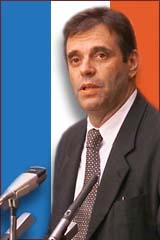Vojislav Kostunica - Biography

Yugoslavia's new president is both a Western liberal and Serb nationalist
by David Johnson |
 President Vojislav Kostunica addresses the federal parliament on Oct. 7, 2000, in Belgrade. (Source:AP) |
Independent Thinker
Kostunica graduated from Belgrade University Law School in 1966, earning a master's degree from the school in 1970. His independent thinking cost him his job in 1974 when he criticized constitutional changes made by then-President Josip Broz Tito.
Writer, TranslatorObtaining another job at an academic institute, Kostunica received a doctorate in 1976. His thesis, on opposition to capitalist systems, was later turned into a book. Kostunica speaks English, German, and French, and translated the Federalist Papers into Serbo-Croatian. He and his wife, Zorica Radovic, another lawyer, lead a quiet life with their dog and two cats in a modest Belgrade apartment before he was thrust into prominence.
Political NeophyteA leading free speech advocate, Kostunica has never held office. He is the only leading opposition leader of his generation never to join the Communist Party. In 1989 Kostunica helped found the Democratic Party. After it split up, he created his own Democratic Party of Serbia. As Yugoslavia disintegrated in the early 1990s, Kostunica maintained that Serbian national identity was a paramount issue. He supported Radovan Karadzic's efforts for Serbian self-determination in Bosnia, but condemned the paramilitary groups and ethnic cleansing. He also opposed the NATO bombing of Serbia over Kosovo, independence for Kosovo, and the Dayton Accords that ended the Bosnian conflict.
| RELATED LINKS |
| Timeline: Yugoslavia Slobodan Milosevic Timeline: Kosovo Yugoslavia Map of The Balkans |
Because he was never allied with President Slobodan Milosevic or with other, more controversial opposition leaders, Kostunica was a considered a "clean slate" in Sept. 2000, when all 18 opposition parties united to support him in the election against Milosevic. Although Kostunica had apparently won the election, the government refused to release complete results and Milosevic called for a runoff election. After a general strike and massive, violent demonstrations rocked the country, Milosevic stepped aside and Kostunica took office.
With the economy shattered from years of sanctions and the infrastructure destroyed during the NATO bombing, Kostunica faced a monumental challenge in rebuilding the country.
